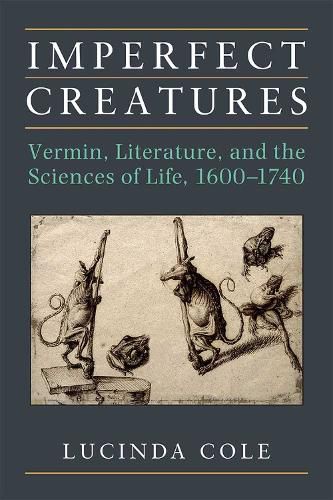Readings Newsletter
Become a Readings Member to make your shopping experience even easier.
Sign in or sign up for free!
You’re not far away from qualifying for FREE standard shipping within Australia
You’ve qualified for FREE standard shipping within Australia
The cart is loading…






Lucinda Cole’s Imperfect Creatures offers the first full-length study of the shifting, unstable, but foundational status of vermin as creatures and category in the early modern literary, scientific, and political imagination. In the space between theology and an emergent empiricism, Cole’s argument engages a wide historical swath of canonical early modern literary texts alongside other nonliterary primary sources (including under-examined archival materials) from the period, including: William Shakespeare’s Hamlet and Macbeth, Christopher Marlowe’s The Jew of Malta, Jonathan Swift’s Gulliver’s Travels, Daniel Defoe’s Robinson Crusoe and Journal of the Plague Year, Giambattista Della Porta’s Natural Magick, William Harvey’s Anatomical Exercises on the Generation of Animals; Thomas Willis’ Cerebri Anatome and Of the Soul of Brutes, and Robert Boyle’s Free Inquiry into the Vulgarly Receiv’d Notion of Nature.
As Cole illustrates, human health and demographic problems-notably those of feeding populations periodically stricken by hunger, disease, and famine-were tied to larger questions about food supplies, property laws, national identity, even the theological imperatives that underwrote humankind’s claim to dominion over the animal kingdom. In this context, Cole’s study indicates, so-called vermin occupied liminal spaces between subject and object, nature and animal, animal and the devil, the devil and disease-even reason and madness. This verminous discourse formed a foundational category used to carve out humankind’s relationship to an unpredictable, a-rational natural world, but it evolved into a form for thinking about not merely animals but anything that threatened the health of the body politic-humans, animals, and even thoughts.
$9.00 standard shipping within Australia
FREE standard shipping within Australia for orders over $100.00
Express & International shipping calculated at checkout
Lucinda Cole’s Imperfect Creatures offers the first full-length study of the shifting, unstable, but foundational status of vermin as creatures and category in the early modern literary, scientific, and political imagination. In the space between theology and an emergent empiricism, Cole’s argument engages a wide historical swath of canonical early modern literary texts alongside other nonliterary primary sources (including under-examined archival materials) from the period, including: William Shakespeare’s Hamlet and Macbeth, Christopher Marlowe’s The Jew of Malta, Jonathan Swift’s Gulliver’s Travels, Daniel Defoe’s Robinson Crusoe and Journal of the Plague Year, Giambattista Della Porta’s Natural Magick, William Harvey’s Anatomical Exercises on the Generation of Animals; Thomas Willis’ Cerebri Anatome and Of the Soul of Brutes, and Robert Boyle’s Free Inquiry into the Vulgarly Receiv’d Notion of Nature.
As Cole illustrates, human health and demographic problems-notably those of feeding populations periodically stricken by hunger, disease, and famine-were tied to larger questions about food supplies, property laws, national identity, even the theological imperatives that underwrote humankind’s claim to dominion over the animal kingdom. In this context, Cole’s study indicates, so-called vermin occupied liminal spaces between subject and object, nature and animal, animal and the devil, the devil and disease-even reason and madness. This verminous discourse formed a foundational category used to carve out humankind’s relationship to an unpredictable, a-rational natural world, but it evolved into a form for thinking about not merely animals but anything that threatened the health of the body politic-humans, animals, and even thoughts.